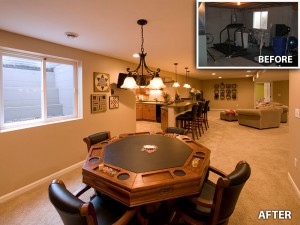Basements have experienced a dramatic shift in reputation over the years. In the beginning, they were often a neglected space. Serving little purpose, other than extra storage space and collecting cobwebs, basements were deemed unlikely to yield a smart return on investment. As time has gone on, more and more homeowners are realizing the benefits of remodeling their lower levels into a potential living space.
“Basement conversion is such an inviting prospect because it is significantly less expensive than putting on an addition,” said Paulette Sodemann, a Sales Design Consultant with Callen. More specifically, many architects and contractors put the cost savings of redoing a basement versus putting on an addition at one-third to one-half less, depending on project scope and area of the country. “Homeowners already own the space and taxes are paid on it; not to mention basements come equipped with a roof, walls, ceiling, foundation and sewer hookups in place,” she added. Consequently, a basement remodel adds value to your home, particularly in urban areas where extra square footage brings a premium.
According to Paulette, there are a few aspects homeowners should keep in mind when tackling a basement remodel. For instance, if your basement shows signs of water or moisture, it’s imperative to resolve these problems in order to avoid replacing furnishings. “Be sure to have a dehumidifier and have proper heating and cooling systems installed for a more comfortable atmosphere,” she said.
“It’s also important that your contractor know the local ordinances regarding the required number and sizes of exits for adding in a bedroom,” said Paulette.
In addition, it’s vital to never seal off existing mechanical systems, circuit breakers, and future plumbing lines. Professionals will need to have access to these for maintenance and repairs. “If needed, homeowners can always soundproof mechanical systems,” she explained.
Moreover, try not to chop up space. “Similar to how homeowners prefer open space on main floor living areas, it should be more open downstairs too,” Paulette said. “It makes the space more transitional of how you will use it as time goes by.”
Finally, homeowners don’t necessarily need to renovate their basement in a style that that is consistent with upstairs. “Basement conversion is unique to the individual. Whether a gym, a theater, or a playroom, the basement can be an outward expression of personality,” she said. “Our team of experts not only makes the necessary provisions, we will also advise you on how you can further optimize your basement design to ensure higher value for your home.”
For more information or to arrange an initial Design Center consultation, call Callen at 414-529-5509.




Leave a Reply